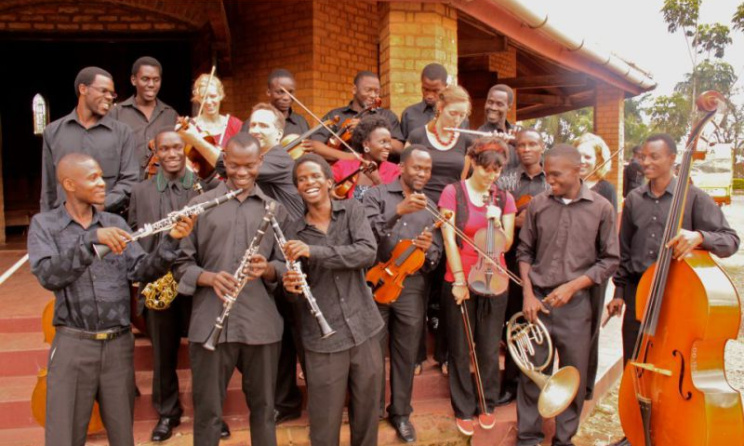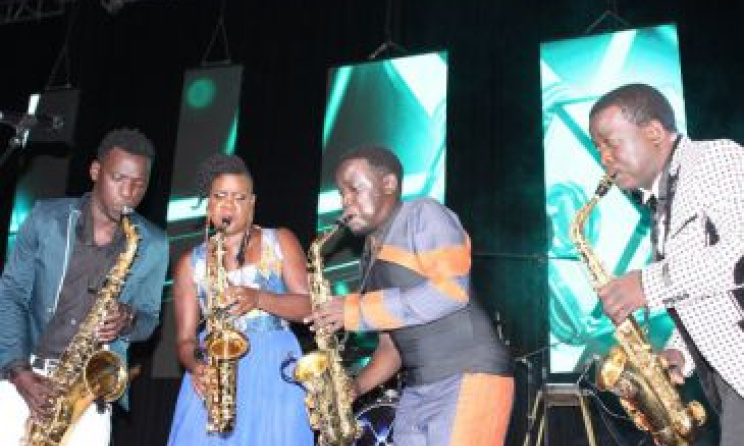Classical music in Uganda
By Benon Kigozi
This text provides an overview of classical music in Uganda.
 The Kampala Symphony Orchestra. Photo courtesy of KSO Facebook page
The Kampala Symphony Orchestra. Photo courtesy of KSO Facebook page Artists perform at a past Qwela concert. Photo: www.chimreports.com
Artists perform at a past Qwela concert. Photo: www.chimreports.com
Classical music in Uganda stems way back to missionary times. However, the absence of Western education before missionaries arrived in Uganda does not mean that music education was not in existence, but rather that it was different from what was introduced by missionaries.
Buganda, the most prominent and biggest ethnic group in the country at that time with over 52 clans, was affected the most by the arrival of missionaries. Because of its rich heritage expressed through singing, dancing, role-playing, costume and poetry Buganda had its own indigenous system of education long before the arrival of missionaries. Indigenous music was informally acquired through the traditional systems of education known as okugunjula, which takes the form of socialisation and maturation of learners, and of inducting them into the accumulated musical heritage of their predecessors. This was and is still a non-formal, life-long process of acquiring and accumulating musical knowledge, skills, attitudes and insights from daily experiences and exposure to community events.
The influence of the church
With the introduction of missionary activities in 1876, the Church of Uganda began. It was modeled on the same principles as the Church of England. Subsequently, Western education was introduced, leading to an immense need for missionary schools and churches. These would later act as training centers for local teachers and church staff who would help in teaching hymns and other songs to church choirs that were now springing up.
When St. Paul’s Cathedral Church at Namirembe was constructed in 1892, the bible was translated into the local Luganda language in 1896. Rev. Murray Duncan pioneered the Cathedral Choir as its first choir master and church organist. It is not surprising therefore that it is the classical music style of worship that dominates the liturgical shape of Namirembe Cathedral Choir and in choirs all around the Church of Uganda as a whole. The predominantly male choir shares more in common with St Paul’s Cathedral Canterbury in England, especially with regard to the kind of classical repertoire and the structure of various programs including the Ten Lessons and Carols during Christmas.
Interesting developments have occurred over the last two decades as the Roman Catholic Church choirs across the country have been greatly influenced by the Anglican choirs. The collaboration began in 1995 with Anglican and Roman Catholic singers joining hands to create a joint choir, the Kampala Singers, which has since developed to become a breeding ground for classical singers. This forum for co-operation and entertainment, for both Anglicans and Roman Catholics alike, peaks out during the festive seasons of Easter and Christmas when the Choir stages classical concerts in Kampala City.
Events and institutions
In 1929, Duncan organized the Namirembe Festival, which later became an annual music competition of Anglican Church choirs and schools based on a sacred classical choral repertoire. The event; which later developed into the National Music Festival under the supervision of George Kakoma (who was then the Inspector General of Schools), was opened up to both primary and secondary schools from all over the country regardless of religious affiliation.
Since then; national music festivals and other music festivals all around the country have been maintained. In 2012, a music festival was organised where compositions were written and sung in a competition to commemorate Uganda’s Golden Jubilee celebrations, and UNICEF has organised a music festival to sensitize the community about the dangers of diseases like malaria. More recently, in Kisoro District of Western Uganda, Water School organised a music festival to highlight the dangers of poor sanitation. Classical music has prevailed as an integral part of music festivals, maintaining the central role of being used to celebrate and educate pupils and parents alike.
In 1971, the Department of Music, Dance and Drama (MDD), currently known as the Department of Performing Arts and Film (PAF), was founded under the leadership of Mbabi-Katana and Moses Serwadda, in order to train musicians and music educators in classical music among other disciplines. Subsequently, classical music performances ranging from choir concerts to music recitals are frequently organised by the department. Most notable among them is the annual Christmas programme and the annual Graduation Recital, both of which are public events.
On various evenings four to five times a year, the sounds of classical repertoire are heard at the Serena Victoria Hall, Sheraton Ballroom or the National Cultural Center in Kampala. When this happens, you know that on stage are talented youths of the Kampala Junior Orchestra performing. Comprising of young male and female musicians, the orchestra performs at such functions as High Scorers’ Concerts of the Associate Board of the Royal Schools of Music, National Days and during visits of foreign guests. During Easter and Christmas celebrations, the orchestra stages classical concerts and in addition, it performs at hotels, schools, weddings. Directed by Kiggundu Musoke, the Kampala Junior Orchestra is about the only classical orchestra in town.
Classical music education
When music was introduced in the curriculum, the teachers taught European songs in a manner similar to what is practiced in Europe. Notable local music scholars included George Kakoma, later composed the Ugandan National Anthem, Adolu Otojoka an Opera singer and music educator, Lwasampijja Kayizzi, the first black organist after Murray Duncan and Michael Kalule the celebrated choir director of Namirembe Cathedral. Some of the local musicians were presented with the opportunity to develop more classical music competence abroad in Britain and France for music development back home, and in the process, the involvement of wider communities across the country in the singing of hymns was inevitable for the consolidation and expansion of missionary activities.
Classical music has now developed beyond just the singing and choirs. With the introduction of western musical instruments including wind, string and keyboard instruments, knowledge of classical music theory has become a natural requirement in order to meet the challenges of securely performing a western instrument. Even if it is not an examinable subject, today classical music is taught in various primary schools. Makerere College School and Gayaza High School are among the few schools that offer classical music at ordinary level and advanced level.
Even though she has since returned back to the United Kingdom, Fiona Carr has been hailed as a musical genius after she pioneered the existence of the Kampala Musical School and ‘Pianos for Uganda’ project aimed at soliciting pianos for music piano scholars in a city where there were no piano stores. Today Kampala Music School alongside MusiConnexions Uganda fills the void of developing young talented classical musicians in Kampala. These go on to become prominent performers and music teachers all around the city.
There are schools that have bigger budgets and stronger music departments in the country. Such schools like Kampala International School Uganda (KISU) boast of diversified music programs encompassing IGCSE, IB and ABRSM music courses. Here students have the opportunity to learn to play two instruments as a bare minimum and iinstrumentation as an integral part of the classroom music program leads to numerous performance opportunities over the year Performances take place during assembly, in form of music recitals, IB Graduation events, Awards Ceremonies, Christmas Concerts, and end of year music productions.
Over the last few years, the Uganda Society for Musical Arts Education (USMAE) has fulfilled the responsibility of preserving, conserving and coordinating musical arts education in Uganda. USMAE has supported classical music events ranging from concerts to workshops and conferences. Currently the society organises these events on an annual basis where scholars present papers on Ugandan classical music as well as engage in the classical music performances alongside non-classical performances.
A number of music schools in a conservatoire model that emphasizes classical music have sprung up in the capital Kampala. The music schools in Kampala include Kampala Music School, MusiConnexions Uganda, Esom Music School. Even though they are not very well equipped as a result of small budgets, they offer appropriate music training to many people. To date more young people and adults alike appreciate classical music better and as such they engage in taking private music lessons, attending classical music concerts and several take part in actual performances.
Ugandan local composers like Wassanyi Sserukenya have found a way to reconcile the gap between Western and traditional music. And today two styles of “Classical music” prevail in the country where modern local church music is fused in a compositional style of Western hymnody and traditional Kiganda style. Local composers have learnt to reconcile a genre learnt by rote, with a Western classical style derived out of scores.















Commentaires
s'identifier or register to post comments